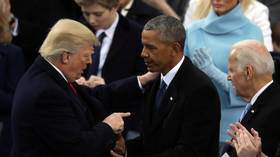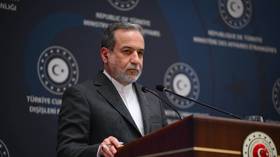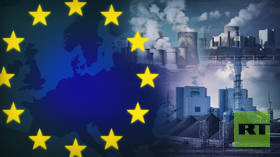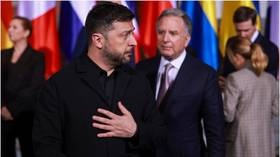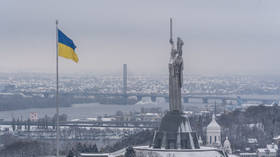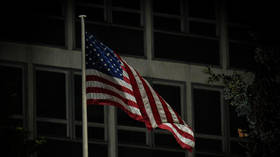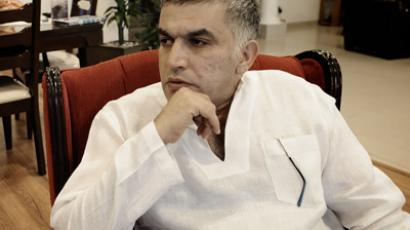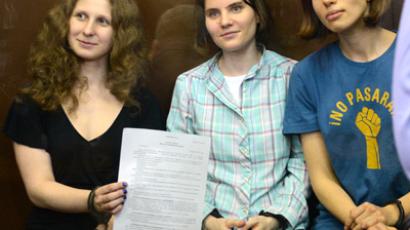'US Pussy Riot reaction shows double standard'

The US State Department reacted to the Pussy Riot verdict by saying the sentences were “disproportionate.” The American stance on the issue is hypocritical, as Washington regularly casts a blind eye on controversial sentences, activist Don DeBar told RT.
Shortly after a Russian judge sentenced three Pussy Riot members to two years in prison for performing a “punk prayer” at Moscow's most prominent cathedral, the State Department issued a statement, saying it was “concerned” about the negative impact the verdict could have on freedom of expression in Russia.“We urge Russian authorities to review this case and ensure that the right to freedom of expression is upheld,” State Department spokesperson Victoria Nuland said. The British Foreign Office also reacted harshly to the ruling. “I am deeply concerned by the sentencing of three members of the band Pussy Riot, which can only be considered a disproportionate response to an expression of political belief,” Foreign Office Minister Alistair Burt stated, adding that he was also perturbed by reports of the conditions of detention and the conduct of the trial. Catherine Ashton, the European Union’s foreign policy chief, said she was “disappointed” with the verdict and also called the sentence “disproportionate.” The Swedish Foreign Minister agreed via Twitter with Russia’s Human Rights Commissioner, Vladimir Lukin, who called the prison sentence unfair. Estonian President Toomas Hendrik Ilves likened the Pussy Riot trial to witch hunts in a tweet. The dramatic conclusion to the case, which had been closely followed by activists around the globe, came as Bahraini human rights activist Nabeel Rajab was sentenced to three years in prison for “inciting” anti-government protests in speeches and tweets. The latter case, however, was not as publicized as the former.The court’s verdict also coincided with a dramatic deterioration of relations between Ecuador and Britain over Quito's granting political asylum to Julian Assange, whom London wants to arrest and extradite to Sweden. Don DeBar, a New York-based activist and journalist, believes America’s negative reaction to the Pussy Riot verdict, but a lack of attention towards the human rights situation in Bahrain is indicative of its double standards. RT: Why did Washington react so strongly to the Pussy Riot verdict but keep silent over the sentencing of a prominent human rights activist in Bahrain?Don DeBar: It’s a double standard. The United States has other double standards that bear on this case too. At numerous times since the beginning of the Iraq War, people have tried to go to churches around the United States to speak to the congregations to say, ‘look, the religious beliefs are so and so, what’s happening violates them, please join us.’ They’ve been threatened with arrest, arrested and worse. So the United States does exactly this. And finally, in New York State alone, and this is true in all 50 states and federally, there is a hate crime statute that this action fits exactly into the parameters of. And what it calls for is sentence enhancement, so that, for example, if you were charged with criminal mischief for interrupting a church service or some other related violation, the penalties get stepped up as if you had committed a more serious crime. Three years is not out of line with the New York State statute, so they are hypocritical across the board.RT: Why did the State Department say it hopes Russia will revise the verdict?DDB: That is the official foreign government’s position. There are geopolitical considerations such as Syria and others that I think are deeply involved. But there are also the unofficial spokespeople for the State Department, particularly Amnesty International and Human Rights Watch, one of which is now actually run by Hillary Clinton’s former chief of staff. I received four separate e-mails from Amnesty International about the Pussy Riot case. I didn’t receive anything about the threat of the UK to invade the embassy of Ecuador in London. So what’s happening is that the United States, for some reason that will become apparent later, is stirring this up to make Russia look as if it were a repressive, lawless state while the United States, which has more incarcerated people than the next three countries on the planet, and that’s only in absolute terms; in relative terms – more than any other country on the planet. The United States has all these people in jail and is going to lecture countries about how their legal process should work. I think it has no credibility around the world, and I think it’s shameful. RT: Does Washington have a right to assess the case and say that it is “disproportionate?”DDB: First of all, I’d be curious to see if they had actually studied the case. I think that geopolitical considerations are driving the statements to come out instead. Certainly it’s not any concern for democracy or democratic rights because they would then be screaming about the situation in Bahrain, which instead they are probably engineering because Bahrain, of course, is the home to their fleet in that area. RT:What kind of reaction from Russia is the US aiming to provoke?DDB: No reaction, so that they could continue to turn up the heat in a public relations fashion against Russia. Because I have concerns that as they move from Cote d’Ivoire to Libya to Syria and eventually Iran, that they may well have Russia in their target, that is the US senior policymakers. And they may well be softening the ground right now to try to show that the Russian government is hostile to its own people, that it lacks legitimacy, all of the things that they accused each other country of as they moved their military forces in. That may be one thing. Another is that it presents a crisis for the Russian government in terms of being an unsolvable problem, if you consider it a problem. Either they continue to do what they do, and they continue to have this public relations campaign conducted against them, or they cave in, ceding part of their sovereignty, obviously, in front of the world, and demonstrating by example that 'if you play this game us, you’ll win.'


